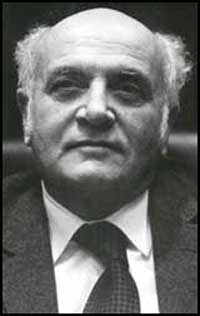Difference between revisions of "Altiero Spinelli"
m (clearer article) |
|||
| Line 20: | Line 20: | ||
|end=4 July 1976 | |end=4 July 1976 | ||
}}{{job | }}{{job | ||
| − | |title=Member of the Italian Chamber | + | |title=Member of the Italian Chamber of Deputies |
|start=5 July 1976 | |start=5 July 1976 | ||
|end=10 July 1983 | |end=10 July 1983 | ||
}}{{job | }}{{job | ||
| − | |title=Member of the European Parliament | + | |title=Member of the European Parliament |
|start=10 June 1979 | |start=10 June 1979 | ||
|end=23 May 1986 | |end=23 May 1986 | ||
| Line 33: | Line 33: | ||
|description=Founder}} | |description=Founder}} | ||
}} | }} | ||
| − | '''Altiero Spinelli''' was an [[Italian]] [[ | + | '''Altiero Spinelli''' was an Italian politician, political theorist and European federalist, referred to as one of the founding fathers of the [[European Union]]. |
| + | |||
| + | A [[communist]] and militant [[anti-fascist]] in his youth, he spent 10 years imprisoned by the [[Italy|Fascist regime]]. Having grown disillusioned with [[Stalinism]], he broke with the [[Italian Communist Party]] in [[1937]]. Interned on the prison island Ventotene during [[World War II]] he, along with fellow [[democratic socialists]], drafted the [[Manifesto for a free and united Europe]] (most commonly known as the [[Ventotene Manifesto]]) in [[1941]], considered a precursor of the European integration process. | ||
| + | |||
| + | He had a leading role in the foundation of the [[European federalist movement]] in [[1946]], and had strong influence on the first few decades of post-World War II European integration. Later, he helped to re-launch the integration process in the 1980s. By the time of his death, he had been a member of the [[European Commission]] for six years, a member of the [[European Parliament]] for ten years right up until his death. The main building of the [[European Parliament]] in [[Brussels]] is named after him. | ||
| + | |||
| + | The [[Spinelli Group]] of European federalists is named after him. | ||
{{SMWDocs}} | {{SMWDocs}} | ||
==References== | ==References== | ||
{{reflist}} | {{reflist}} | ||
{{Stub}} | {{Stub}} | ||
Revision as of 16:44, 30 November 2020
(politician) | |
|---|---|
 | |
| Born | 1907-08-31 Rome, Kingdom of Italy |
| Died | 1986-05-23 (Age 78) Rome, Italy |
| Nationality | Italian |
| Alma mater | Sapienza University of Rome |
| Children | Barbara Spinelli |
| Spouse | Ursula Hirschmann |
| Founder of | Italian International Affairs Institute |
| Party | Communist Party of Italy, Action Party, Republican Democratic Concentration, Independent Left |
Altiero Spinelli was an Italian politician, political theorist and European federalist, referred to as one of the founding fathers of the European Union.
A communist and militant anti-fascist in his youth, he spent 10 years imprisoned by the Fascist regime. Having grown disillusioned with Stalinism, he broke with the Italian Communist Party in 1937. Interned on the prison island Ventotene during World War II he, along with fellow democratic socialists, drafted the Manifesto for a free and united Europe (most commonly known as the Ventotene Manifesto) in 1941, considered a precursor of the European integration process.
He had a leading role in the foundation of the European federalist movement in 1946, and had strong influence on the first few decades of post-World War II European integration. Later, he helped to re-launch the integration process in the 1980s. By the time of his death, he had been a member of the European Commission for six years, a member of the European Parliament for ten years right up until his death. The main building of the European Parliament in Brussels is named after him.
The Spinelli Group of European federalists is named after him.
Events Participated in
| Event | Start | End | Location(s) | Description |
|---|---|---|---|---|
| 1948 Hague Congress | 7 May 1948 | 11 May 1948 | Netherlands The Hague | Landmark conference which had a profound influence on the shape of the European Movement. Many of the groups organizing the conference received covert funding from the CIA. |
| Bilderberg/1968 | 26 April 1968 | 28 April 1968 | Canada Mont Tremblant | The 17th Bilderberg and the 2nd in Canada |
| Congress for Cultural Freedom/Founding Conference | 26 June 1950 | 29 June 1950 | Founded the Congress for Cultural Freedom. The participants had a "a culpable incuriosity about funding" of the luxurious conference, which was later exposed as CIA money. |